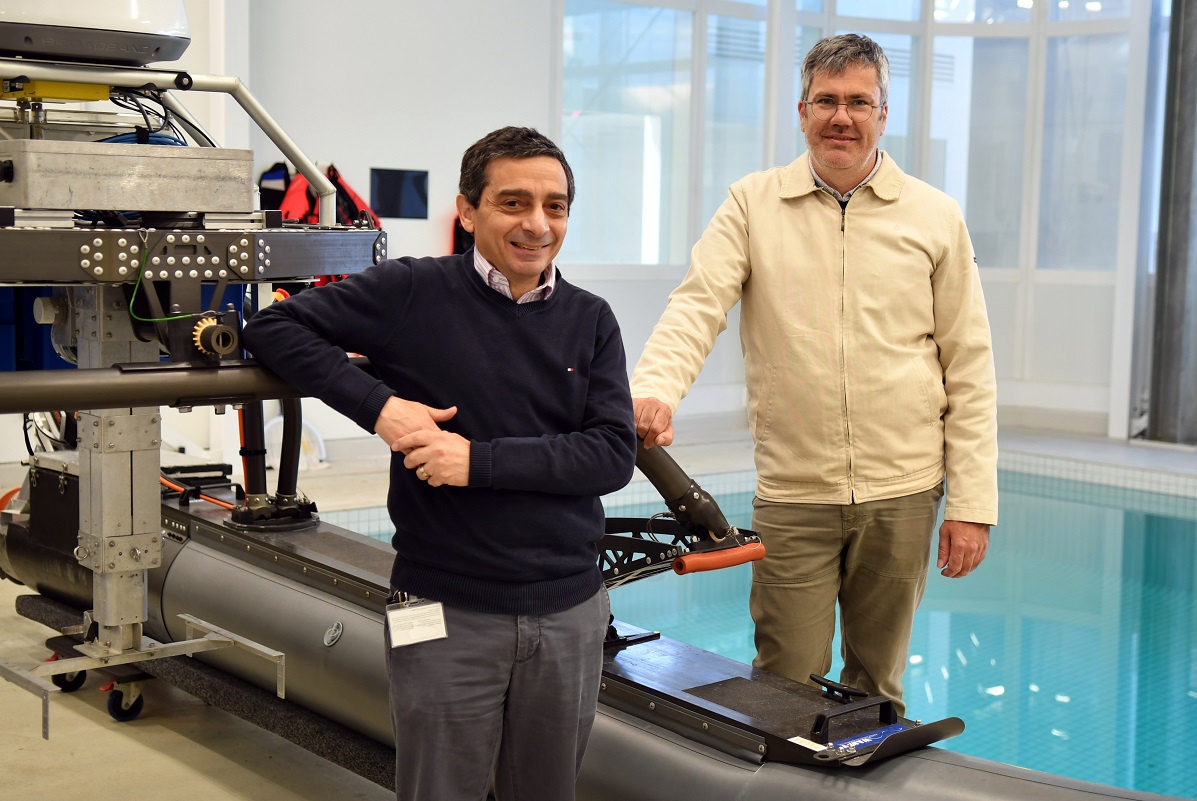
Professor Benoit Clement is preparing to pack up and head back to leading French Graduate School of Engineering ENSTA Bretagne next week, closing an eight-month chapter progressing autonomous underwater vehicle technology with Flinders University.
Funded by the French DGA (the government agency overseeing the development and purchase of defence equipment in France) and the Regional Council of Brittany, Professor Clement worked with Professor Karl Sammut and his team at the Flinders Centre for Maritime Engineering, Control and Imaging towards their bold mutual goal of enabling autonomous marine vehicles to think for themselves.
Focused on autonomous marine technology, Professor Clement brings a wealth of experience from a background in maths, physics and space. He is the Deputy Head of Lab-STICC at ENSTA Bretagne, which is a multidisciplinary French CNRS Laboratory leader in information and communication technology.
Flinders and ENSTA Bretagne have formed strong ties in recent years and have signed a range of high profile agreements with French defence companies Naval Group and Thales, as they advance their mutual defence interests.
“We want to take humans out of dangerous situations by developing unmanned marine vehicles that are capable of performing the same tasks as human operators, such as searching for mines under water,” Professor Clement says.
“But the sea has so many unknowns… modelling the marine environment is challenging, the interaction between the sea and vehicles is difficult to model precisely, there is the need to conserve battery usage and thus increase endurance, so artificial intelligence may provide a new answer to optimise the vehicle control.”
Both deep-sea and shallow water environments pose great challenges.
“These include lengthy acoustic communication delays so you cannot act immediately – by the time you get the information it may be too late to act.”
The team, including colleagues at Flinders and ENSTA Bretagne, is therefore working on the development of autonomy enhancements for underwater vehicles to improve their situation awareness and enable them to routinely tune and maintain themselves to achieve optimal performance.
Professor Clement says their research will retain the robustness of established classical control algorithms but improve on them with artificial intelligence enhancements. (Continued below)
Professor Clement chats at Tonsley campus about his research with Flinders University:
Within a few years’ time, Professor Clement and Professor Sammut hope to have developed successful simulation tools and completed initial validation tests with the vehicles available at the two institutions.
“As we want to go further, we’ll need industry assistance for longer range, longer duration, at-sea testing. This is why our collaborations with our defence partners are so important,” Professor Clement says.
The team’s bold goals won’t be achieved overnight, so Flinders University and ENSTA Bretagne plan to share research and resources, and provide exchange opportunities for students for years to come, equipping undergraduates and postgraduates from both institutions with fantastic skills and experiences as they too become pioneers in this dynamic field.
Professor Clement brought his family of five over for their own international immersion, embracing Adelaide’s lifestyle and regional attractions over summer, with the children now experts in the English language and Aussie culture.
The timing for incoming ENSTA PhD and Nicolas Baudin intern students was not so fortunate, with COVID-19 stamping out planned visits and forcing Flinders Nicholas Baudin Internship winners home early. The restrictions also kept domestic students working from home, so supervision and mentoring activities over the trip had to be done remotely, impacting on lab activities and field work.
As joint supervisor of PhD students with Professor Sammut, Professor Clement is looking forward to returning to Flinders and interacting more when the pandemic situation improves. “It was great to meet Flinders students online, but it is not the same when you are speaking to a computer while drinking your coffee!”
In return, Flinders’ Professor Sammut aims to resume his work at ENSTA Bretagne in the future, with a view to strengthening the relationship, building industry partnerships, and supporting Flinders PhD students and those on Nicolas Baudin internships. Professor Sammut and Dr Paul Gardner-Stephen have previously secured support to visit ENSTA Bretagne under the SA Government’s South Australia-Brittany Research Collaboration Grant.
Professor Sammut emphasised: “The collaboration with ENSTA Bretagne is important for our research and teaching activities.”
Flinders’ students secured nine internships in France with a corresponding six internships for French students at Flinders under the 2019 French Embassy’s Nicolas Baudin Internship programs, which unfortunately were cut short or supervised on-line this year.
“Our students have been the leading recipients in Australia of Nicolas Baudin internships to date, including receiving one-third of last year’s internships across the country,” Professor Sammut says. “This really highlights the skills of our students and the strength of our French relationships, and we’re committed to growing both of these further.”
Professor Clement concurs: “Our universities have the same tools, the same robots, the same goals in autonomous underwater vehicle technology. So it’s easy to share the knowledge, train students between our institutions and collaborate in this exciting area.”

